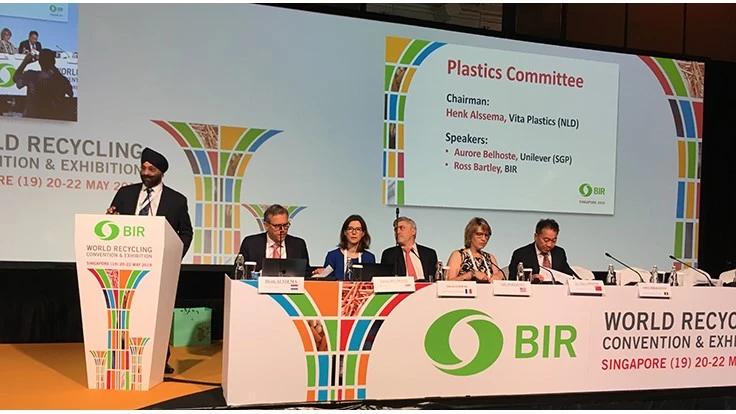
Europe-based household goods producer Unilever is taking steps toward its goal of using 25 percent recycled content in its plastic packaging by 2025, said a procurement manager for the firm who spoke at the Plastics Committee meeting of the Bureau of International Recycling (BIR). The Brussels-based BIR held its 2019 World Recycling Convention in May in Singapore.
Aurore Belhoste, who works from Singapore as a procurement manager for Unilever, said the multinational firm has taken numerous steps in recognition of the world’s concerns about single-use plastics as a contributor to plastics in the ocean.
Some of those measures involve substituting for plastic, including the use of paperboard and aluminum as a packaging material in place of plastic and designing a toothbrush made of bamboo. “We are trying to reduce our use of single-use plastics,” said Belhoste.
Of greater encouragement to the recyclers gathered, Unilever also has made efforts to source and use recycled-content plastics (also known as postconsumer resin, or PCR) in its packaging. Belhoste commented that 26 percent of the plastic used globally goes into packaging and that a global sustainability effort Unilever has signed onto calls for “responsible consumption and production” of the raw materials it uses.
To live up to that commitment, Belhoste said Unilever has identified two main goals: “By 2025, all of our plastic packaging will be reusable, recyclable or compostable,” and “by 2025, 25 percent of plastic packaging will come from recycled plastic content, or PCR.”
Belhoste pointed to the 100 percent PCR packaging used in Unilever’s Love Beauty and Planet products as one example.
She also said collection efforts underway in nations including India and Indonesia are being developed to capture more discarded plastic for recycling in nations such as those, where it too often ends up in the natural environment, and then the ocean. The goal of such efforts “is to come up with different pilots and scale them up,” said Belhoste. Some of the pilot programs involve apps that can let scavengers know where they can bring certain types of plastic and be paid for it.
On the PCR production front, Belhoste said Unilever continues to work with technology providers to overcome challenges related to odors that can arise from using PCR, and in creating colors for PCR products that can be acceptable to consumers.
Any good news that can come from deep-pocketed companies like Unilever will be welcomed by plastics recyclers. BIR Plastics Committee delegates portrayed a 2019 market for plastic scrap that is challenging. Steve Wong of Hong Kong-based Fukutomi Recycling Ltd. said in East Asia “almost all types of recycled polymers are not selling well.” For recyclers there, “Profit margins are narrow and getting less and less.”
Clement Lefebvre of Veolia Proprete France Recycling said European primary producers “now want to play a role in the recycling world,” which could help absorb European plastic scrap that formerly headed to China, Malaysia and Thailand. In the next 10 years Europe may need to develop more than 1 million metric tons of capacity, “and that’s a huge challenge,” said Lefebvre. (Within days of the BIR convention’s conclusion, Malaysia’s government proclaimed it would begin returning imported plastic scrap shipments to their country of origin.)
In the United States, export markets also “have been greatly reduced” stated Sally Houghton of the Plastic Recycling Corp. of California. Within the U.S., however, Houghton said there is healthy demand for HDPE and PET scrap, with polypropylene (PP) also growing as a grade that is attracting significant investments in domestic recycling capacity.
BIR immediate past President Ranjit Baxi summed up the current situation by saying, “Plastic is at the forefront of all recycling conversations.”
Stated Plastics Committee Chairman Henk Alessma of Netherlands-based Vita Plastics, “The plastic industry is in a transition phase from a linear model to a circular economy model.”
The 2019 BIR World Recycling Convention & Exhibition was held May 19-22 at the Shangri-La Hotel in Singapore.
Latest from Recycling Today
- BMW Group, Encory launch 'direct recycling’ of batteries
- Loom Carbon, RTI International partner to scale textile recycling technology
- Goodwill Industries of West Michigan, American Glass Mosaics partner to divert glass from landfill
- CARI forms federal advocacy partnership
- Monthly packaging papers shipments down in November
- STEEL Act aims to enhance trade enforcement to prevent dumping of steel in the US
- San Francisco schools introduce compostable lunch trays
- Aduro graduates from Shell GameChanger program





